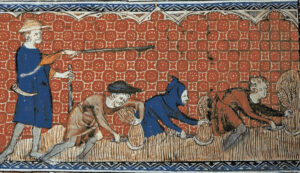5. Medieval Society
The Normans formalised and enforced the class system in England; known as the feudal system, with the King at the top. It was based on the rights to land ownership and the duties that came with that, often in the form of military service.
In Torrington the head was the Tenant-in-Chief; this man held the wider region directly from the king and was a nobleman, the Barons de Toriton. This family was descended from Odo FitzGamellin, William the Conqueror’s nephew; they had consolidated their power by marriage with another rich Norman family, the FitzBerners.
Next powerful was the Lord of the Manor role, a title specific to a land holding. The Lord of Manor would owe his allegiance to the Tenant-in-chief and would run the specific manor, on the noble’s behalf. In Torrington the Barons de Toriton, however were both Tenants in Chief and Lords of the Manor.
In a town like Torrington, those next in charge were the Knights! A Lord of the Manor will have a Bayliff/Steward who administered the estate on the day to day. There would also have been a town guard, who guarded the walls and maintained social order, as there were no police! The Barons de Toriton would also have had military-trained knights in the household, sons of other high status men, their own private army battalion.
Towns also had a high status group of citizens called Burgesses, people who owned their own properties and had trading or professional businesses, merchants or lawyers etc. These people made up the officials of the town, like the Mayor, Clerk, Town Crier. In a rural place like North Devon farmers, outside of town, who owned their own land and houses and could trade their goods in the market were called Yeomen.
The majority of people rented their houses from the Lord of the Manor and worked on his land as payment in kind; these were known as Serfs. Ultimately their lives were in complete control of the Lord, who could decide issues like marriage agreements, inheritance, fines, punishment for crimes and even exile someone. The Lord of the Manor could therefore charge the serfs for permissions, such as a licence to marry, called a Merchet. The Lord would also tax the Serfs for their produce, they also had to pay tax for the support of the church each year. The Lord could also decide on church fines, such as if a serf had a child outside of marriage, Chidewrite. If land was sold by a Lord, he would sell the houses and occupying serfs, with the land.
After the Black Death had devastated population numbers in the 14th century, it became illegal to be unemployed in the countryside. If you were homeless, had been exiled or run away you were called a Vagabond. If caught you could be whipped, branded and charged a fine, often they were driven out and lived in illegal settlements in the woods or wild remote places, as outlaws.
Life was stressful for the Serfs and rivalries were high, insults and gossip were one of the few ways they could control their own environment. Some classic medieval insults the people of Torrington would have used: Bamfoozle – lier, deceiver; Rakefire – bad guest, one who overstays their welcome; Raggabrash – messy/disorganised person; Muckespout – foul mouthed, ill-educated; Coxscomb – vain, strutting person; Whiffle waffle – time waster; Bewattled – confused, stupid or drunk person.


